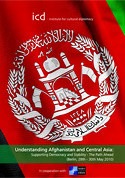The International Symposium on Cultural Diplomacy 2010:
Culture, Globalization, and International Relations over the next Two Decades

Understanding Afghanistan and Central Asia: Supporting Democracy and Stability - The Path Ahead
(Berlin, 28th – 30th May 2010)Introduction
The International Symposium on Cultural Diplomacy will run from 23rd - 30th May 2010 and will consist of three related, component parts. The third and final part of the program is entitled "Understanding Afghanistan and Central Asia: Supporting Democracy and Stability - The Path Ahead" and will run from Friday, 28th May to Sunday, 30th May. This part of the program aims to raise awareness of the history and development of Afghanistan and the central Asian region, explore the political, economic, and security challenges currently faced in the area, and consider the role that the international community can play in helping to ensure sustainable development, democracy, and stability.The participants of “Understanding Afghanistan and Central Asia” will include the participants of the International Symposium on Cultural Diplomacy 2010, in addition to invited guests from the fields of international politics, diplomacy, academia, and civil society, and other interested stakeholders in Afghanistan and central Asia.
“Understanding Afghanistan and Central Asia” will take place over a period of three days and will consist of lectures, seminars, and panel discussions held by leading figures from the fields of politics, diplomacy, economics, academia, civil society, and the private sector. These components will be complemented by cultural and social activities that will provide an opportunity to experience the diversity of Afghan and central Asia culture and provide networking opportunities between the participants.
Program
Understanding Afghanistan and Central Asia will consist of lectures, seminars, and panel discussions that will focus on the following issues:- The History and Development of Afghanistan and central Asia: The political and societal origins of modern day Afghanistan and its neighbouring states, focusing in particular on their early origins, their role during the Cold War, and their development since 2001.
- International cooperation in Afghanistan and central Asia: The role played by the international community in providing financial, strategic, military, and other support to ensure stability and development in Afghanistan and the central Asian region.
- Strengthening Democracy and Governance: The challenges faced by national governments in ensuring democratic, transparent state institutions, and holding peaceful, free, and fair elections.
- Economic Reform and the Development of the Private Sector in Afghanistan and Central Asia - An analysis of the importance of strengthening the private sector in the region, in particular through the diversification of income opportunities and the support of international trade and investment.
- Developing Human Capital: The challenges faced in the provision of healthcare and education facilities and the repatriation of refugees and displaced peoples.
- The Path Ahead and the Younger Government: Key challenges facing the next generation of Afghan and central Asian leaders in ensuring stability and development, and a consideration of how they can be supported.


























































































